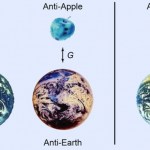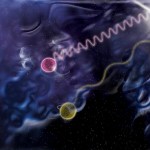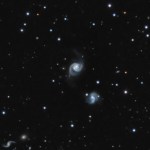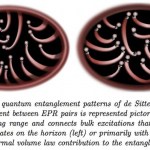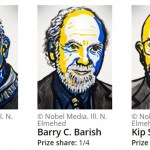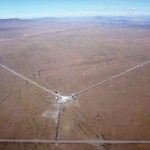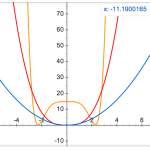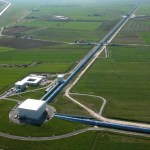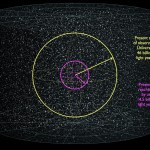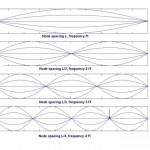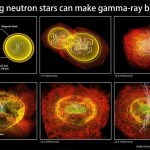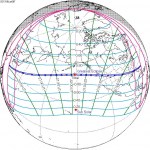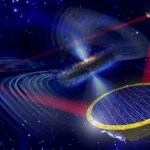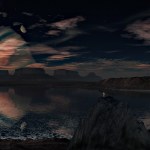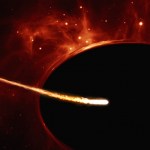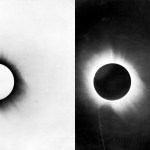gravity
"Dark matter is interesting. Basically, the Universe is heavier than it should be. There's whole swathes of stuff we can't account for." -Talulah Riley
One of the most puzzling facts about the Universe is that 95% of the energy in it, in the forms of dark matter and dark energy, are completely invisible, and have never been directly detected. Perhaps, the story goes, it’s our theory of gravity that’s to blame, rather than needing new components in the Universe. While dark matter and dark energy can explain a whole slew of observations, gravity modifications do a better job of explaining…
"Designing a station with artificial gravity would undoubtedly be a daunting task. Space agencies would have to re-examine many reliable technologies under the light of the new forces these tools would have to endure. Space flight would have to take several steps back before moving forward again." -Andy Weir
Ever wonder, in those science fiction shows, how space travelers always stay “down” on their starship? Irrespective of acceleration, and despite the fact that the astronauts we have in orbit around Earth are weightless, they’re always depicted as having a floor and a ceiling that are…
"This is going to have a bigger impact on science and human understanding, in many ways, than the first discovery of gravitational waves. We're going to be puzzling over the observations we've made with gravitational waves and with light for years to come." -Duncan Brown
Detecting black holes and the gravitational wave signals from them was an incredible feat, but doing the same thing for neutron star mergers is a true game-changer. Instead of fractions of a second, neutron star mergers show up for up to half a minute. Unlike black holes, there’s an electromagnetic counterpart. Because of…
"It’s becoming clear that in a sense the cosmos provides the only laboratory where sufficiently extreme conditions are ever achieved to test new ideas on particle physics. The energies in the Big Bang were far higher than we can ever achieve on Earth. So by looking at evidence for the Big Bang, and by studying things like neutron stars, we are in effect learning something about fundamental physics." -Martin Rees
When the Advanced LIGO detectors turned on in 2015, it shook up the world when they detected their first event: the merger of two quite massive black holes. Since that time, they’ve…
“Something is happening here and this is going to have an impact.” -Robert Dijkgraaf, on Verlinde's work
There are many attempts out there to reconcile the quantum field theories that describe the electromagnetic and nuclear forces with general relativity, which describes the gravitational force. Certain questions, about gravitational properties in strong fields and on small scales, will never be answered otherwise. In order to make that happen, we'd need a quantum theory of gravity. While string theory is the most popular idea, there are others, such as asymptotic safety, loop quantum…
"Wormholes are a gravitational phenomena. Or imaginary gravitational phenomena, as the case may be." -Jonathan Nolan
Yes, we detected gravitational waves, directly, for the first time! Just days after Advanced LIGO first turned on, a signal of a 36 solar mass black hole merging with a 29 solar mass black hole gave us our first robust, direct detection of these long-sought waves, changing astronomy forever. Einstein’s General Relativity was validated in a whole new way, and over 40 years of work on developing and building LIGO was vindicated at last.
The inspiral and merger of the first pair…
"Well, I walked into Building 20 and looked in at the various little labs. There was a bunch of people doing something that looked to me to be sort of interesting, and since I knew all this electronics, I asked them, “Look, can you use a guy?” And I sold myself off as a technician for about two years." -Rai Weiss, on the start of his physics career at MIT
It’s official at long last: the 2017 Nobel Prize in Physics has been awarded to three individuals most responsible for the development and eventual direct detection of gravitational waves. Congratulations to Rainer Weiss, Kip Thorne, and…
"I know of no other scientist, no other theoretical physicist alive who has a clearer focus on whether our theories and ideas are relevant to the real world. And that's always what he's after." -Neil Turok, on Paul Steinhardt
The inflationary Universe is one of the most revolutionary new ways of looking at the cosmos to come out of the last 40 years of science. Instead of going all the way back to a singularity from which time, space, matter, and energy all emerged, cosmic inflation posits a different state that gave rise to our hot, dense, matter-and-radiation-filled Universe. With energy…
"Einstein's gravitational theory, which is said to be the greatest single achievement of theoretical physics, resulted in beautiful relations connecting gravitational phenomena with the geometry of space; this was an exciting idea." -Richard Feynman
For over a century after the publication of General Relativity, it was uncertain whether gravitational waves were real or not. It wasn’t until their first direct detection less than two years ago, by the LIGO scientific collaboration, that their existence was spectacularly confirmed. With the VIRGO detector in Italy coming online this year to…
“The more clearly we can focus our attention on the wonders and realities of the universe about us, the less taste we shall have for destruction.” -Rachel Carson
The idea that the spatial fabric of the Universe itself is expanding, and that’s what’s behind the observed relationship between redshift and distance has long been controversial, and also long-misunderstood. After all, if more distant objects appear to recede more quickly, couldn’t there be a different explanation, like an explosion that flung many things outward? As it turns out, this isn’t a mere difference in interpretation,…
“There will be days when we lose faith. Days when our allies turn against us...but the day will never come that we forsake this planet and its people.” ―Optimus Prime
There was too much to simply keep it to a single article a day this week here at Starts With A Bang! The dynamic duo of Megan Watzke and Kimberly Arcand published a delightful contribution on scale, and we're gearing up for a month where we'll highlight some of the telescopes of the 2020s (and maybe beyond) that will help shape the future of astronomy.
In the meantime, those of you who caught totality from the eclipse…
"It’s becoming clear that in a sense the cosmos provides the only laboratory where sufficiently extreme conditions are ever achieved to test new ideas on particle physics. The energies in the Big Bang were far higher than we can ever achieve on Earth. So by looking at evidence for the Big Bang, and by studying things like neutron stars, we are in effect learning something about fundamental physics." -Martin Rees
Two years ago, advanced LIGO turned on, and in that brief time, it’s already revealed a number of gravitational wave events. All of them, to no one’s surprise, have been merging black…
"Presently thought to be the most powerful explosions in nature... their sources have only recently been localized by observations of associated afterglows in X-rays, visible light, and radio waves, delayed in that order." -Richard Matzner, on the dictionary entry for Gamma Ray Burst
It seems like an eternity ago, but it’s been under two years since LIGO first began the science run that would first detect merging black holes. Their latest scientific data run is scheduled to end in just two days, and thus far, they’ve announced a total of three black hole-black hole merger discoveries, along…
“Astronomers are greatly disappointed when, having traveled halfway around the world to see an eclipse, clouds prevent a sight of it; and yet a sense of relief accompanies the disappointment.” –Simon Newcomb
On August 21st, a total solar eclipse will travel coast-to-coast across the United States, bringing darkness during the day to portions of 14 separate states. The last time such an event occurred was 99 years ago, back in 1918. Back then, Einstein’s General Relativity still had not been proven, and this eclipse not only provided that opportunity, but held an opportunity for America to…
"The years of searching in the dark for a truth that one feels but cannot express, the intense desire and the alternations of confidence and misgiving until one breaks through to clarity and understanding, are only known to him who has himself experienced them." -Albert Einstein
In 2015, for the very first time, gravitational waves were directly detected from the merger of two massive black holes. These ripples in space traveled over a billion light years before they were finally detected. When they were, it validated Einstein’s theory of General Relativity in an entirely new fashion, and…
"Lord of Light! Come to us in our darkness. We offer you these false gods. Take them and cast your light upon us. For the night is dark and full of terrors." -Melisandre, George R.R. Martin's A Song of Fire and Ice
Imagine a world where you know that winter is coming, but you don’t know when, or for how long, or how severe it will be. Sounds like fiction, doesn’t it? In our own solar system, where planets orbit a single star in elliptical, well-separated orbits, this is extraordinarily unlikely. But if a binary giant planet existed in the habitable zone, and a world like Earth orbited both of…
“Nobody ever did, or ever will, escape the consequences of his choices.” -Alfred A. Montapert
So you’re passing by a black hole in a massive, fast-moving spaceship, and you want to do an experiment: you tether a small mass outside of the ship and let it fall into the black hole, just allowing it the tiniest bit inside, while your ship takes off to try and escape. If you can keep the tether from breaking and your ship from getting stretched apart, what’s going to happen?
Even something as massive as a star, if brought too close to a black hole, will find itself stretched-and-compressed into a…
"Eddington had needed to make significant corrections to some of the measurements, for various technical reasons, and in the end decided to leave some of the Sobral data out of the calculation entirely. Many scientists were suspicious that he had cooked the books. Although the suspicion lingered for years in some quarters, in the end the results were confirmed at eclipse after eclipse with higher and higher precision." -Peter Coles
If ever you attempt to come out with a new scientific theory, there are three criteria you must fulfill:
You must reproduce all the successes of the old theory,…
"Einstein's gravitational theory, which is said to be the greatest single achievement of theoretical physics, resulted in beautiful relations connecting gravitational phenomena with the geometry of space; this was an exciting idea." -Richard Feynman
There’s no doubt that LIGO has given us one of the most incredible breakthroughs of the 21st century: the direct detection of gravitational waves. But as wonderful as LIGO is, so far it’s only been able to detect the very final stages of mergers of stellar mass-scale black holes, and only every few months at that. The technique of laser…
"What's really exciting is what comes next. I think we're opening a window on the universe -- a window of gravitational wave astronomy." -Dave Reitze, executive director of LIGO
It revolutionized our view of the Universe when the LIGO annoucements – and we’re up to three, now – came out. They indicated the direct detection of gravitational waves from merging black holes, teaching us about a new population of stellar remnants, confirming the existence of gravitational waves, and showcasing yet another victory for Einstein’s General Relativity. But it all rests on one critical assumption: that…

